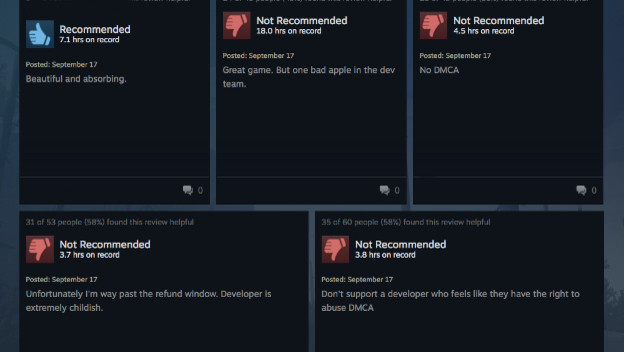If you agree with the phrase, “an eye for an eye leaves the whole world blind,” then you might have something to say about some recent events. At this point we’re all probably really well aware that Felix “PewDiePie” Kjellberg let slip a particular unsavory word during a stream. He apologized immediately, and most of the Internet thought we would all be able to move on. At that point, the creators of Firewatch, Campo Santo, threatened to take DMCA action against PewDiePie. They did so, forcing the removal of any of PewDiePie’s videos featuring their game. In response, a whole horde of people have taken to Steam to review bomb Firewatch .
For those unfamiliar with the phrase, review bombing refers to when a large group of people post negative reviews on a game in an attempt to skew the overall score. Since the Firewatch review bombs began, another large group of people have been leaving positive reviews in an effort to level things out. Funny enough, it doesn’t really matter on either point, because Steam has made some changes to their review system. Now there is a visual analytic available for reviews that highlights when review bombings might be occurring. The graphic shows the overall reviews for a game, and shows in further detail when large amounts of negative reviews are pouring in. Steam isn’t making an official connection between this update and the Firewatch reviews, but sometimes things are just obvious.
Not only does this new analytic make it super easy to spot when review bombing is happening, this instance isn’t even condoned. The original person in question, PewDiePie, has made a public statement on his Twitter saying that he does not support the Firewatch review bombing. Frankly, I’m sure PewDiePie just wants to move on with his life like anyone else. He wants to get past all of this hubbub and continue doing what he does. The same is undoubtedly true of most everyone on the internet. Many people didn’t even know what Firewatch was until all of this drama started.
What it all really boils down to is this. If something negative happens and someone retaliates, then the spiral of madness begins. This all started with one word and has now even led to changes within the Steam review system. An eye for an eye really can leave the whole world blind. Or it can bring out all the Internet crazies who feel the need to defend one opinion or another via the misuse of systems. The Digital Millennium Copyright Act is there for a reason and should not be abused, but neither should user-generated review systems.

One of these things could get you in legal trouble while the other is just a rotten thing to do. Leaving a “negative review” on Steam that has nothing to do with the actual game in question just makes things more complicated for everyone. I don’t know about you, but I pay fairly close attention to the review section on Steam. It’s often a deciding factor for me when it comes to whether or not I’ll buy a game. If it’s done really well consistently I’m more likely to buy said game. Thanks to Steam’s new system it’ll be easier for me to spot review bombing when it happens, but it doesn’t need to occur in the first place.
If you don’t like a game, then write a negative review. Explaining why you don’t like it is especially helpful. If you like a game, then write a positive review. In this case, elaborating on what you enjoyed about it is also admirable. If you don’t like the company that made said game because they have differing political views than you, or one streamer has a beef with them, then leave the review section alone. That is not the time or place for airing your grievances. There are plenty of places to discuss literally anything you want on the Internet. There are forums, and all of your social medias. Take those by storm and complain all you want. But leave the review section for actual helpful information that will give your fellow gamers a clue as to whether or not they want to play something. It’s really that simple.
Image Credit: SinEniS
